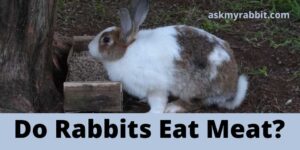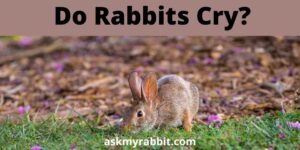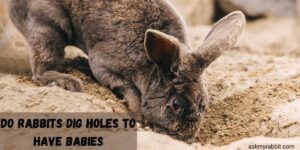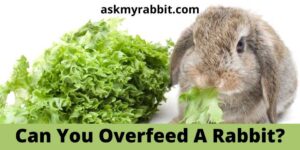Feeding your rabbit a balanced diet is a very straightforward task as the items required for good nutrition are easily available. While hay and grass should make up the majority of your rabbit’s diet, pellets and veggies should make up the remainder.
Pellets are a part of a rabbit’s diet. A non-pelleted diet is conceivable, but it necessitates a careful balance of nutritional supplies from a variety of vegetables and hay. Most rabbit owners prefer to supplement their rabbit’s diet with pelleted food in addition to hay and veggies.
Hay is used to make pellets. They are also balanced with nutrients that your bunny need, which may or may not be present in a certain bale of hay depending on where it was grown or the weather conditions at the time. It’s critical to select a high-quality pellet.
Look for a basic one with no colourful bits, crispy puffs, seeds, or nuts. When it comes to calcium and fat, look for pellets that have more fibre and less protein. Request a referral from your bunny’s veterinarian. And, most importantly, don’t overfeed.
The pellets will need to be rationed for most mature rabbits. If you don’t, they’ll overeat and gain weight. They might not eat enough hay when they’re full from pellets.
So, you may be wondering, how much pellets should I feed my rabbit?
A typical daily amount for a five to seven pound adult rabbit is one-fourth to half cup. Bunnies who need to reduce weight will need to eat fewer pellets and move more.
Baby or developing rabbits, up to six months, as well as ill bunnies in need of weight growth, should be fed unlimited pellets in addition to their hay and vegetables. Alfalfa-based pellets should be provided to young and developing rabbits.
If you want to learn more about rabbits and their need for pellets, keep reading!
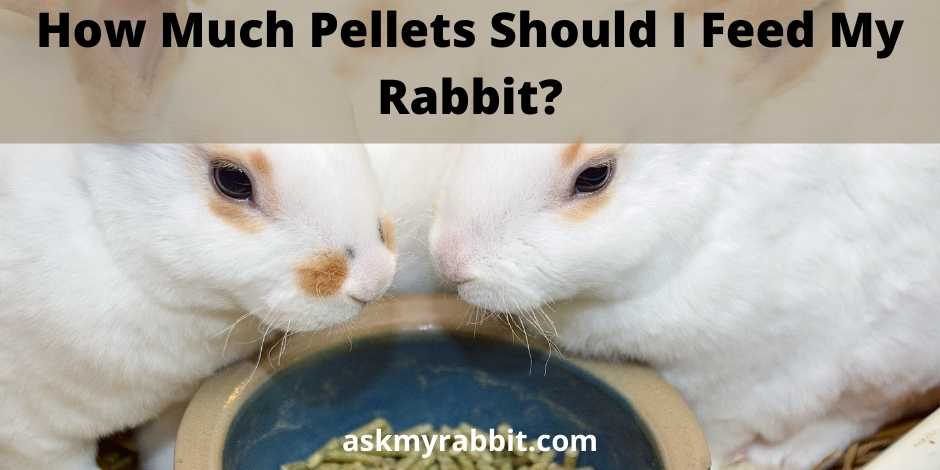
What Are The Benefits Of Feeding Your Bunny Pellets?
Rabbit pellets are a mixture of chopped hay and other minerals, notably fibre. While these are the most common components in pellets, some pellets can contain artificial colours or vegetable additions that aren’t required.
Rabbit pellets are cheap and simple to come by. Pellets have a long shelf life if they are stored away from moisture.
Pellets, when chosen correctly, provide the nourishment that the rabbit requires for a healthy digestive tract.
The following are the benefits of pellets for rabbits:
1. Good Palatibility
During pelletizing, a technique known as starch pasting is used to give the feed pellets a delightful flavor and enhance their palatability. This helps to stimulate the rabbit’s appetite.
2. Rigidity
Feed pellets have a higher stiffness than wet mixing powder feed. This makes them more suited for rabbits that enjoy grinding their teeth with hard objects.
3. Healthy
Third, pellets successfully protect rabbits against nutrition disequilibrium induced by food pickiness.
4. Improve Digestion
Pellets aid in the digestion of feed and are beneficial to rabbits’ gastrointestinal digestion and absorption.
5. Reduces Spread Of Disease
Pellets aid in sterilisation and disinfection, as well as reducing disease transmission. Pellet feed may destroy a portion of parasite eggs and harmful microorganisms reducing rabbit illness considerably.
Furthermore, the use of feed pellets can help decrease feed waste, which saves money for the farmers.
How To Correctly Feed Pellets To Rabbits?
When supplemented with the right fruits and vegetables, rabbit pellet diets are nutritious and tasty. You must, however, understand how to feed your rabbit pellets securely and correctly.
Choose the type of pellet you should buy for your rabbits. Rabbits of various ages have varying dietary and nutritional requirements. For rabbits younger than seven months, alfalfa hay pellets are best, and timothy hay pellets are best for adults.
Calculate the amount of food you should give your rabbits. Make sure you don’t overfeed your rabbit. Obesity in rabbits might shorten their lives. They’ll be exhausted from not being able to move enough.
Feed pellets should be kept in a clean, closed container. The pellets should be shielded from dirt, sunlight, darkness, water, and other animals in this manner. Close the lid as much as possible to reduce the risk of germs.
Fresh, clean water should be available to your rabbit at all times. Place a water container in the rabbit’s cage and make sure your rabbit has fresh water on a regular basis. Also, clean the container on a daily basis.
Monitor the rabbit’s weight and adjust the feeding rate to keep it at the appropriate level.
If you have any doubts regarding your rabbit’s diet or observe any changes in his or her eating habits, consult your veterinarian.
Finally, rabbit feed pellets are ideal for growing rabbits. To get the most out of rabbit feed pellets, you must select the right rabbit pellets and understand how to properly feed your rabbits.
Do Rabbits Need Pellets In Their Daily Diet?
Pellets have long been a component of a rabbit’s diet, but that doesn’t mean they’re good for them. Excess pellets may, in fact, cause obesity and other diseases in rabbits, according to study.
We may alter our rabbits’ meals to make them balanced and healthy as we learn more about rabbit health. This entails examining the food we feed our rabbits and determining whether or not it is still necessary as part of a balanced rabbit diet.
Pellets can be beneficial to rabbits in tiny amounts, but they are not an essential element of a rabbit’s regular diet. Pet rabbits can be healthy on a pellet-free diet if they are fed a balanced diet of grass-based hay and a range of leafy green vegetables.
We all know how vital it is to transition pet rabbits to a hay-based diet. Some rabbit owners, on the other hand, are going the extra mile and feeding their bunnies a totally natural, pellet-free diet. Wild rabbits, after all, can thrive without pellets.
What Kind Of Pellets Should I Feed My Bunny?
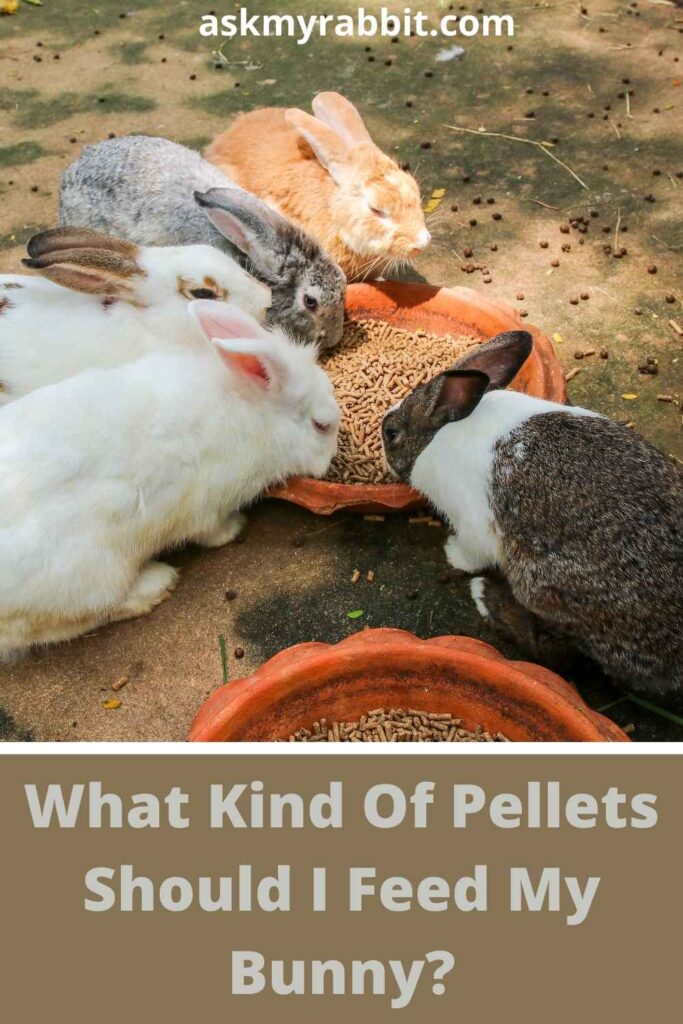
Pellets should not contain dried fruit, seeds, nuts, colourful crunchy objects, or other visually appealing items.
Rabbits are strict herbivores, and in the wild, they seldom encounter fruit, nuts, or other fatty meals commonly seen in pet store bags. While they are very pleasing, they are of little use to your rabbit.
If too much simple, digestible carbohydrate is ingested, the complex flora of the cecum can soon become dangerously unbalanced. This will happen especially if the diet is typically deficient in fibre.
A high-quality rabbit pellet should include at least twenty-two percent crude fibre, no more than fourteen percent protein, one percent fat, and one percent calcium.
Before you buy rabbit pellets, read the label. Most commercial pellets are made from alfalfa, which means they have more calories and less fibre than pellets made from timothy.
Baby bunnies may eat as much pellets as they like since their bones and muscles require a lot of protein and calcium to grow properly. Commercial pellets, on the other hand, provide more calories and nutrients than a healthy adult rabbit requires.
It will not only cause obesity, but it will also deter the rabbit from eating enough hay to maintain excellent intestinal health.
These recommendations may also be used to ensure that your rabbit’s chosen brand is safe for them:
- To begin, double-check that the pellets are basic, dull brown pellets. Rabbits should only be fed pieces of dried fruit as rewards.
- After that, you’ll want to look through the ingredients list. You want to make sure these pellets are made from hay. The first item on the list should be timothy hay or timothy grass.
- You may also look through the rest of the components on the list to ensure that the majority of them are real, identifiable substances.
- The nutritional value of the pellets is the final item you should look at. You’ll want to make sure they’re high in fibre and low in fat.
Pellets are a fantastic way to enhance your bunny’s diet, but they aren’t required. Increase the variety and serving size of vegetables to replace the nutritional value without the calories, however most people choose to feed a pellet and plant-based diet!
Should I Stop Giving My Rabbit Pellets?
Pellets are still considered a healthy element of a balanced rabbit diet when provided in tiny amounts.
Because rabbits are more likely to be enthusiastic about eating pellets than hay, a rabbit that suddenly refuses to eat their pellets is displaying an early indication of illness. Pellets enriched with vitamins and minerals that are beneficial to rabbits are also available.
It is, however, quite feasible to maintain a rabbit healthy on a pellet-free diet. Wild rabbits, on the other hand, never have access to produced pellets and are able to maintain their health.
If you want to feed your rabbit a natural diet consisting solely of grass-based hays and fresh leafy greens, you can rest certain that it is safe to do so. You can have a happy and healthy bunny in either situation, so the choice is yours.
If you wish to feed your rabbit a pellet-free diet, you’ll have to modify the amount of hay and leafy greens you offer them. This will guarantee that they can replenish the calories that the pellets would provide in their diet.
When switching to a pellet-free diet, it’s also vital to provide your rabbit with a broader range of hays and vegetables to ensure they’re getting all of the vitamins and minerals they’re missing from the pellets.
What Are The Benefits Of Using A Rabbit Feed Pellet Mill?
A rabbit feed pellet mill is a must-have tool for anybody in the rabbit farming business since it allows them to feed their rabbits in a cost-effective and nutritious manner.
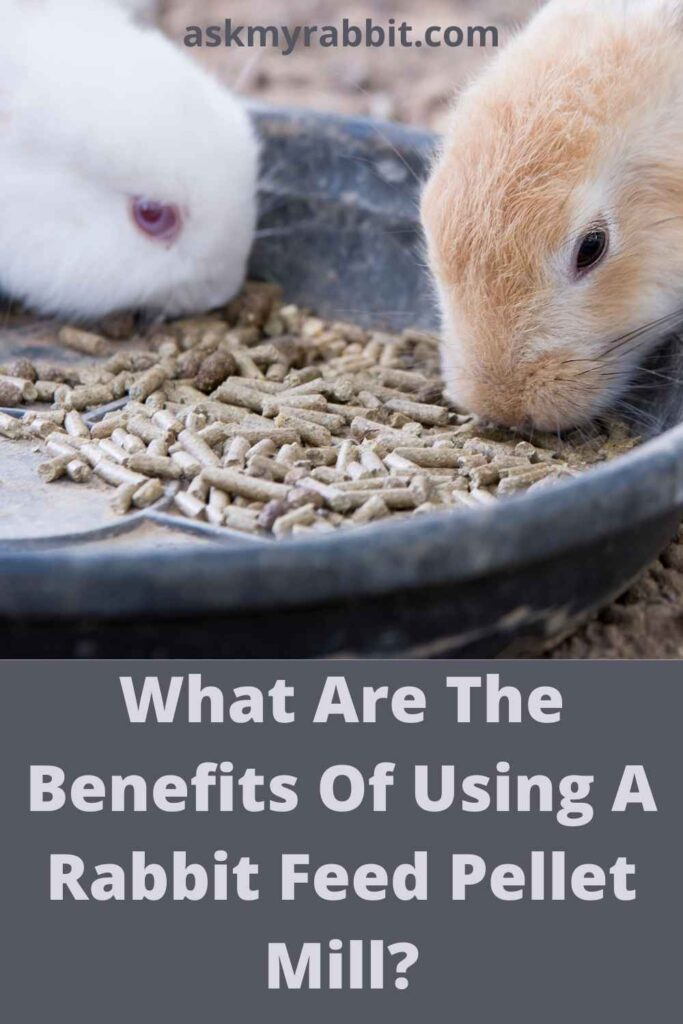
The benefits of using a rabbit feed pellet mill are :
1. To Stay Away From Picky Eater Situations
Because the rabbit feed pellet mill blends all of the fodder together, the rabbits are unable to pick what they eat. This results in a healthy diet that is equally distributed. This also guarantees that the pellets produced are of excellent quality.
2. Cost Effective
Because all of the fodders are mixed to form these small pellets, they are easier to load, store, and transport. This saves a significant amount of money in the storage and transportation of rabbit pellets.
3. Increased Immunity
The pellets produced by the rabbit feed pellet mill have an equal amount of nutrients, resulting in a very healthy combination that prevents illnesses from infecting the animals.
4. Increased Growth
During the production process, these pellets ripen, increasing the food’s digestibility and assisting the rabbit’s health and growth.
5. Rabbit Gets Fresh Fodder
If you own a rabbit feed pellet mill and are in the rabbit farming industry, you can simply regulate the nutrition in the pellets while still providing fresh food to your rabbits.
Should Young Rabbits Eat Pellets?
Adult rabbits require a different mix of pellets in their diet than young rabbits that are still growing. Their bodies are still growing, so they may benefit from the concentrated nutrients found in their daily pellets.
As a result, we do not advocate feeding a totally pellet-free diet to young rabbits, especially those aged six months and younger. Instead, once the rabbit achieves full adult weight, pellets should be gradually decreased.
Yes, young rabbits should eat pellets. You should ensure that your baby rabbit eats hay in addition to pellets. If your rabbit is entirely disregarding their hay, you may try to cut less on their pellets.
Young rabbits should also be fed an alfalfa-based diet rather than one based on timothy. Alfalfa hay has more calcium and proteins than other types of hay.
Pellets may not suitable for adult rabbits, but it is perfect for young rabbits. As a result, rather than obtaining timothy-based pellets, you should get alfalfa-based pellets for your baby rabbit.
How Do I Get My Rabbit To Eat Their Pellets?
If your rabbit refuses to consume pellets for reasons other than health, you can switch them to a pellet-free diet. However, before totally eliminating the pellets, you might try to discover ways to encourage them to consume them.
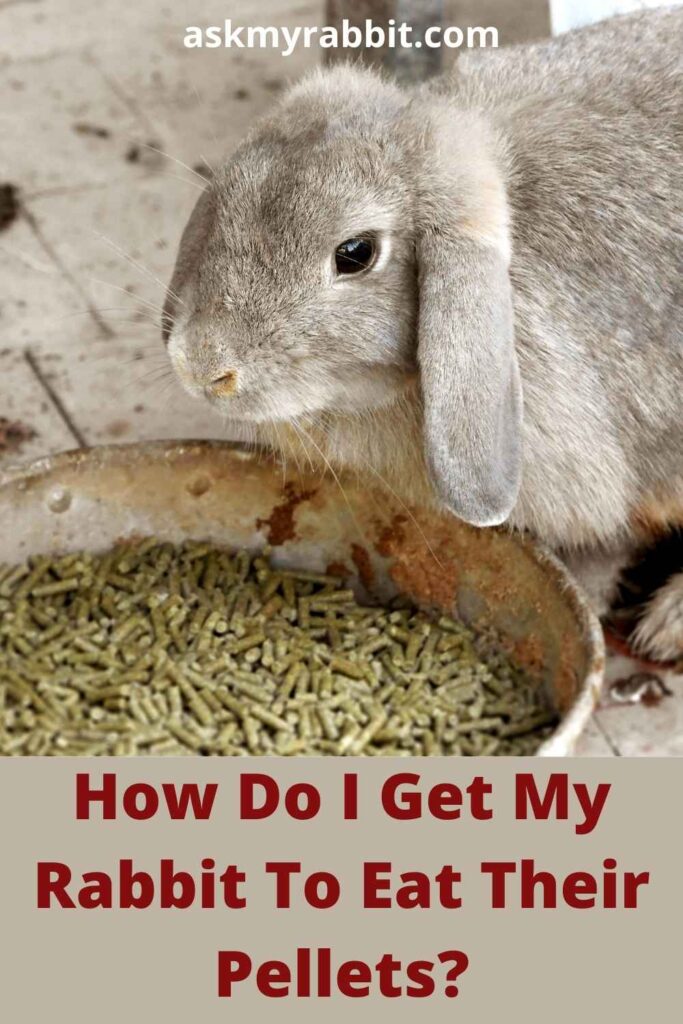
Follow these tips to help your rabbit eat their pellets :
1. Make A Slow Transition
Alfalfa pellets are typically preferable than timothy pellets in terms of flavor. To get your young rabbit acclimated to the new flavor, gradually introduce it to their new diet over a few months.
2. Change Brands
Make a switch to a different brand. Different kinds of pellets have different flavous, so if your rabbit doesn’t like one, try a different one.
3. Mix Pellets With Food
Combine the pellets with hay or leafy greens for your rabbit. If you drop a handful of pellets into your rabbit’s daily greens or hay dish, they may consume some while eating their other feeds.
4. Control The Amount Of Pellets
Reduce the number of pellets in your rabbit’s diet on a daily basis. Make sure you keep the daily pellets to a minimum based on your rabbit’s weight. If rabbits have had access to too many pellets, they may become bored with them.
5. Keep The Pellets Fresh
Pellets should be replaced on a regular basis. To keep your rabbit’s pellets fresh, store them in a sealable, airtight container and change them every day, even if your rabbit hasn’t finished them.
Frequently Asked Questions
Are Pellets Good For Bunnies?
Alfalfa pellets should be offered to young rabbits under the age of seven to eight months. As they develop, they will require more protein and calcium.
Why Do Rabbits Like Pellets So Much?
Pellets are preferred by most rabbits over hay. Rabbit pellets are mostly composed of carbohydrates, and rabbits prefer carbohydrates to fibre.
Should Rabbits Eat Pellets Everyday?
Pellets can be beneficial to rabbits in tiny amounts. However, they are not an essential element of a rabbit’s regular diet.
Final Words
To support healthy development and vitality, a rabbit’s digestive tract requires a mix of the proper nutrients. Feed pellets are an excellent rabbit meal, and most rabbit owners select them because they are nutritious.
They also consist of compressed alfalfa, grains, and vitamins, and may be fed to rabbits of all ages. They are also easy to store.
Alternative pellet brands with significantly higher nutritional content for rabbits have since been developed. Even these healthy brands, however, can fast lead rabbits to acquire weight.
As a result, it is advised that bunny parents limit the number of pellets in a rabbit’s diet on a regular basis.
We request that you drop down your queries regarding your bunny in the comment section below. We will answer them soon!

